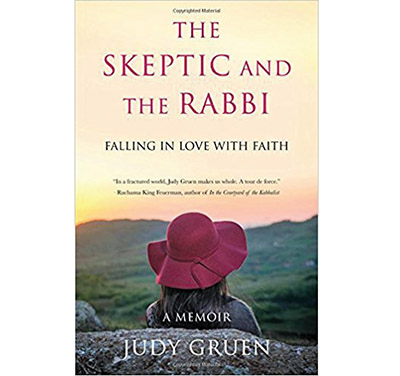
Reviewing: “The Skeptic and the Rabbi,” by Judy Gruen. She Writes Press, 256 pages, 2017. ISBN: 978-1-63152-3201.
How did a woman who grew up in the 1960s and 70s as a liberal feminist become a shomer Shabbat, hair-covered, Orthodox balabusta, in La La Land no less? Judy Gruen answers that question in her memoir, “The Skeptic and the Rabbi.”
Gruen writes with affection and sometimes self-deprecating humor about her journey. As a child living in Van Nuys, California, she has two diametrically opposed role models in her grandparents. Her paternal grandparents are devout atheists, but wonderfully intellectual and sophisticated. Grandmother Ceci Rosenfeld is a physician, with a specialty in homeopathic medicine, and many celebrity patients. Her maternal grandparents are traditional Jews. Papa Bernard Cohen—whose name was changed at Ellis Island by immigration officers from Beryl Konopioty—is a Conservative rabbi, still learned and kosher, but in the enlightened fashion of the times, drives to shul. Gruen loves the traditional aspects of her religious grandparents’ lives but not their serious, dour approach. Nana Cohen (nee Ethel Goldman) is fond of repeating the Yiddish saying, “Iz shver tzu zayn a yid,” It’s hard to be a Jew. Not very inspiring! Gruen wants the flair of the atheist and the spirituality of the religious. “Could I possibly carve out a life that would blend the best of my grandparents’ distinct and singular worlds? I wanted more joie de vivre than oy de vivre.”
Gruen makes it through the angst of adolescence to what seems like a sure path to success. She edits her college newspaper and after graduation, lands jobs writing for corporate communications. A mutual friend gives her phone number to Jeff Gruen, a guy who has just moved to LA, and they hit it off. Except. Except that he has questioned the superficial upper middle class status his parents worked so hard to achieve, and has decided that authentic, observant Judaism is the key to a meaningful life.
Gruen resists. After all, if her Conservative grandparents are so strict, how could she tolerate being Orthodox? This is where the skeptic meets the rabbi. She grudgingly meets Rabbi Daniel Lapin, who heads the Pacific Jewish Center (PJC) in Venice, an Orthodox synagogue Jeff has begun attending. And slowly she asks the questions and gets the answers that help her reach that elusive goal of childhood. She can have a relationship with God and have joie de vivre. It’s called simcha. From the title of the book, you might think the story revolves around Gruen arguing with the rabbi and finally admitting that he is right. But once Gruen embraces Rabbi Lapin’s Judaism, the focus is on how she commits to building a marriage and a life as an observant Jew. And then there’s the next chapter in the Gruens’ lives: bringing up frum children with secular relatives. And riding out the existential questions of the next generation.
Anyone who has followed a similar path will appreciate the way Gruen builds her case for embracing Orthodox Judaism. She learns and she contemplates. She gives herself permission to discard the politically correct assumptions that obfuscate her real desires: “I wanted to become a wife and mother every bit as much as I wanted a successful writing career. In college, I couldn’t admit how much I wanted this because marriage and motherhood had been deemed a second-rate career by avant-garde thinkers and many in the professoriate. In my new circles at PJC, I could safely share my hidden resentment of that message.”
For those who have become shomer Shabbat later in life, reading “The Skeptic and the Rabbi” is a little like being in a support group for Baalei Teshuva. When Gruen talks about the barely concealed hostility of secular family and friends for becoming Orthodox, you want to say, “I know what you mean, why can’t they be more accepting?” Yet Gruen also understands the disgruntled secularists: The newly observant are a challenge to their Jewish identity and their ability to maintain a relationship with someone who can no longer spend Saturdays going shopping or dining at the same restaurants. Gruen’s breezy style, which at times can veer to almost patronizing, serves as a gentle explanation to incredulous friends and relatives of BTs.
There have been several memoirs written by men and women from Orthodox families who chafed under the restrictions and wanted out. Gruen’s story is an articulate, heartfelt narrative about the value of coming in. “Do it because I say so” makes a questioning individual run in the opposite direction. Rabbis who want to keep observant Jews in the fold, or help them return, should teach like Rabbi Lapin: with joie de vivre, not oy de vivre. That’s what makes men and women like the Gruens conclude that it may be hard to be a Jew, but worth the effort.
By Bracha Schwartz











